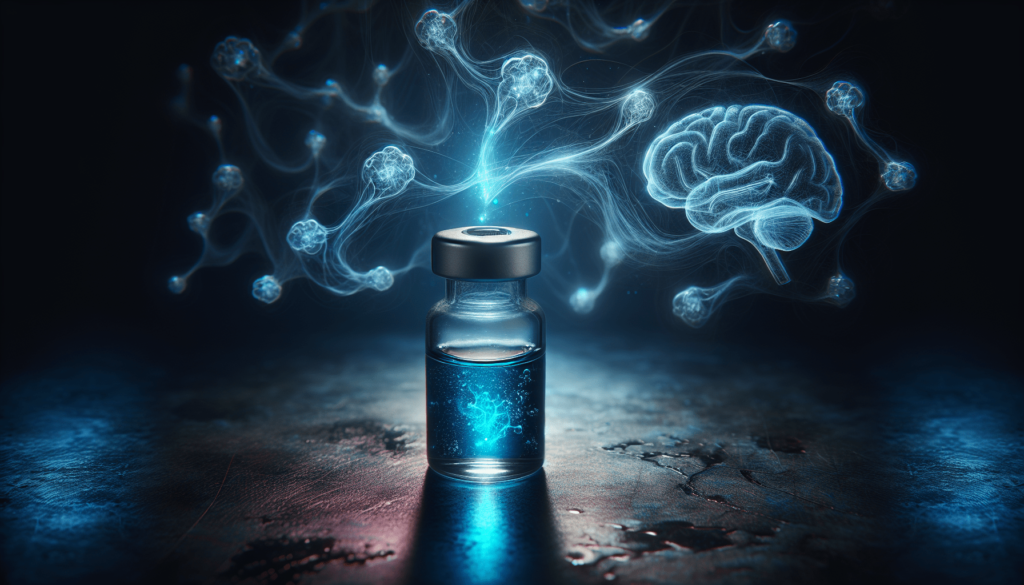
Have you ever considered how the quality of your brain’s oxygenation can affect your thoughts and feelings? It’s fascinating to think about how closely our cognitive capabilities are tied to our biology. One compound that has emerged as quite significant in this realm is methylene blue. Let’s break down the science, implications, and potential benefits of methylene blue in relation to brain oxygenation and cognitive function.

Understanding Methylene Blue
Methylene blue is a chemical compound with a rich history, originally created as a dye. However, its applications extend far beyond coloring fabrics. It’s been utilized in medicine for over a century, particularly in treating conditions like methemoglobinemia. But what makes it relevant to you and your cognitive functions today?
Methylene Blue as a Mitochondrial Enhancer
The primary action of methylene blue lies in its ability to improve mitochondrial function. Mitochondria, often referred to as the powerhouses of the cell, play a crucial role in energy production. When you think of your brain functioning optimally, imagine it like a finely-tuned engine. If the engine is well-fueled, everything runs smoothly. Methylene blue acts as a facilitator in this process, enhancing the efficiency of your cells’ energy production.
Role in Oxygen Utilization
Methylene blue helps facilitate the transfer of electrons within the mitochondria, improving your cells’ ability to utilize oxygen. This is not just about more oxygen; it’s about better oxygen utilization. Your brain relies heavily on oxygen, and when it can absorb and use it more effectively, cognitive processes can become sharper and more efficient.
The Link Between Oxygenation and Cognitive Function
It’s fair to say that your brain’s performance hinges on its oxygen supply. Just like your body needs proper fuel for physical activity, your brain requires a consistent and effective flow of oxygen to perform at its best.
How Oxygen Affects Cognitive Functions
Think about your mental performance during different activities. When you’re fatigued or unfocused, it might be linked to reduced oxygen availability. On the other hand, when your brain receives adequate oxygen, you’re likely to experience improved concentration, better memory retention, and more profound insights. Research indicates that sufficient oxygen levels can enhance synaptic plasticity, crucial for learning and memory.
Implications of Poor Oxygenation
When oxygen levels are impaired, you could experience symptoms like confusion, memory lapses, and even mood swings. Chronic low oxygenation may result in more severe cognitive decline over time. For people facing conditions that compromise oxygen supply, like sleep apnea or chronic obstructive pulmonary disease (COPD), this can be particularly concerning.
How Methylene Blue Influences Brain Oxygenation
Methylene blue’s ability to improve mitochondrial functionality may result in enhanced oxygenation for the brain. By influencing pathways associated with energy metabolism, it can help ensure that your brain is getting what it needs.
Increased Blood Flow to the Brain
One of the fascinating aspects of methylene blue is its potential to promote vasodilation, which refers to the widening of blood vessels. When your blood vessels open up, more oxygen-rich blood makes its way to your brain. This process not only ensures a consistent supply of oxygen but also helps transport other vital nutrients necessary for optimal cognitive function.
Neuroprotective Properties
Research is also suggesting that methylene blue possesses neuroprotective properties. This means that it may help protect your brain from oxidative stress and damage caused by toxins. By stabilizing cellular energy processes, methylene blue could mitigate damage in conditions marked by toxic buildup—such as neurodegenerative diseases.
Absorption and Dosage
If you are intrigued by the potential benefits of methylene blue, it’s essential to understand how to absorb it effectively. Depending on the formulation, its method of administration can vary. You might find it available as a solution, capsule, or even a powder.
To maximize its benefits, consult a healthcare professional regarding appropriate dosages, as the optimal amount can vary based on individual metabolic needs and conditions.
Cognition and Mental Health Implications
So how do these physiological changes translate to your daily life? The cognitive implications of improved brain oxygenation are broad and multifaceted.
Enhanced Memory Retention
One of the standout effects of proper oxygenation is improved memory. With enhanced synaptic plasticity, your brain can form new memories more easily. Studies have shown that individuals who maintain better oxygen levels tend to recall information more effectively.
Improved Focus and Attention
Imagine sitting down to study or work. With improved oxygen supply, you could achieve a state of heightened focus, where distractions seem less formidable. Methylene blue may help in this area, allowing you to engage in tasks with more clarity and intention.
Mood Stability
Cognitive function and mental health are often intertwined. Low oxygen levels can contribute to fluctuations in mood and increased anxiety. By enhancing brain oxygenation, methylene blue may help create a more stable emotional landscape. Instead of feeling overwhelmed or unfocused, you might experience a greater sense of control.

Clinical Applications of Methylene Blue
Considering its myriad effects on brain oxygenation and cognition, methylene blue has drawn attention in various clinical settings. Let’s take a closer look at some notable areas.
Neurodegenerative Diseases
Conditions like Alzheimer’s and Parkinson’s disease introduce complexities in brain function. Methylene blue has been researched for its potential neuroprotective effects, which could help slow the progression of these diseases. By supporting mitochondrial function and reducing oxidative stress, methylene blue presents an exciting area of research.
Traumatic Brain Injury (TBI)
In the aftermath of a traumatic brain injury, oxygen deprivation can lead to severe complications. Methylene blue’s capacity to improve oxygen utilization has led scientists to explore its use in TBI recovery. The potential for it to promote protective mechanisms and enhance recovery is an exciting prospect that could change the landscape of treatment.
Mental Health Conditions
Beyond neurodegenerative diseases, there are mental health conditions characterized by mood instabilities, such as depression and anxiety. Researchers are examining the efficacy of methylene blue as an adjunct treatment in these cases, with early findings showing promise in affecting mood regulation positively.
Potential Risks and Considerations
While the exciting possibilities of methylene blue are hard to ignore, awareness of potential risks is essential. Just as any compound has its benefits, it can also carry side effects or implications that warrant caution.
Toxicity and Dosage
Methylene blue can be toxic at high doses, and understanding the right balance is crucial. Overdosage may lead to symptoms like nausea, dizziness, and a blue discoloration of urine. Multiple sources suggest that working with a healthcare professional is essential to find the dosage that works for you, particularly if you’re considering it for therapeutic purposes.
Interaction with Medications
You should be mindful of any existing medications you are taking. Methylene blue may have interactions with drugs, particularly those that affect serotonin levels or blood pressure. This is another reason why consulting with a healthcare provider is critical before beginning supplementation.
How to Introduce Methylene Blue into Your Routine
If you find yourself intrigued by the potential benefits of methylene blue, consider these steps to introduce it into your regimen.
Consultation with a Healthcare Provider
Before adding any new supplement to your routine, it’s crucial to discuss it with your healthcare provider. They can provide personalized advice based on your medical history and current medications. This step is vital for ensuring that you embark on this journey safely.
Lifestyle Considerations
To maximize the benefits of methylene blue, complement it with a healthy lifestyle. This includes regular exercise, a balanced diet rich in antioxidants, and maintaining good hydration levels. These factors all contribute to the overall health of your brain and body.
Monitoring and Adjusting
Once you start using methylene blue, pay close attention to how you feel. Keep track of any changes in cognitive function, mood stability, or overall energy levels. This self-monitoring will help you discuss any necessary adjustments with your healthcare provider.
Conclusion: The Ongoing Journey
Understanding the relationship between methylene blue, brain oxygenation, and cognitive implications is no small feat. It’s an evolving world filled with new research and findings. Seeing the balance between potential benefits and risks emphasizes the importance of approaching this topic with care.
As you ponder the complexities of oxygen in cognitive function and how methylene blue might play a role, remember that your brain health is essential. Continue to seek knowledge, consult with experts, and explore avenues that enhance your mental agility and overall well-being. Your brain is one of the most delicate and powerful organs in your body, so cherish it and treat it with the care and respect it deserves.